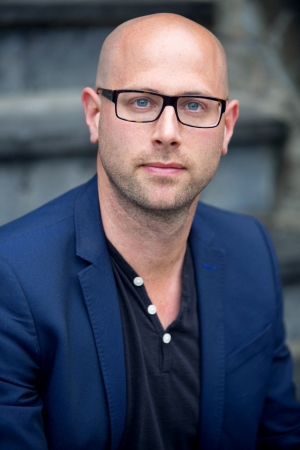The demand for online health care and mental support has increased significantly in recent years and, with restrictions to in-person appointments imposed by the COVID-19 pandemic, access is more important than ever.
“How can we support people to feel, be and live well?” asks Mark Stolow, BA 02, founder and CEO of Huddol, a digital platform that empowers people to live fully through the support of a curated network of transformational coaches.
“We invite people to honestly ask themselves ‘What is the vision for my life?’ That is the question we encourage everyone to contemplate as the starting point for nurturing a deeper sense of well-being,” he says. “Living healthier begins with being healthier and connecting back to what kind of life we want to wake up to every day.”
Much of Stolow’s professional career has been dedicated to the creation of digital wellness solutions, supporting a variety needs, such as mental health and support for people struggling with family care or living with a chronic health issue, among others.
“Huddol has been around since 2016, but our work traces back to 2004,” says Stolow. “Our understanding and vision for how we can better use technology to support people in actualizing their greatest potential has gotten increasingly precise and refined over the years.”
Huddol is managed by the Canadian Caregiver Network (CCN), a non-profit organization that traces its roots back to the family caregiver support space. In 2004, while completing his Bachelor of Arts in Religions and Cultures at Concordia, Stolow helped found the CCN. Today, through its Huddol platform, the CCN is shaping a new vision for how to inspire people to take ownership of their health. The CCN has helped more than 500,000 people through its digital health solutions.
‘Technology can be a great instrument for introducing people to new ideas’
From early on in his career, Stolow observed how technology could become a game-changer in the health-care landscape. He saw the increased demand for online health care increase, especially during the pandemic.
“I think if anything, what technology has done during the pandemic is that it's ensured a level of continuity when people were cut off from in-person care,” he says.
According to Stolow, access to online health care during the pandemic has allowed people to take advantage of technology by consulting with health care professionals from a distance. He says digital medicine is instrumental in the future of the health-care industry, allowing it to become more streamlined.
He’s quick to point out, however, that technology is not a fix-all for problems within the industry and that it should not replace in-person connection.
“We don't want to lose that very intimate human contact, which is vital to our overall well-being. Technology can be a great instrument for introducing people to new ideas, new concepts, new experiences at scale,” he says. “But it doesn't change the fact that when it comes to transformation, it is a very human and stripped back experience.”
Concordia pride
Looking back at his undergraduate years at Concordia, Stolow recalls his education as structured, yet liberal, challenging him to think about things in new and different ways. “I am indebted to Concordia for the style of education that it invited me into,” he says. “I had a creative disposition that was nurtured in my undergraduate years. It stirred in me something that has endured throughout my career; the courage to experiment and explore.”
Following graduation, Stolow took the same creative energy and diligence he harnessed as a Concordia student and directed it into his work. He’s proud of Huddol’s progress, where they are “advocating for a new version of health care, one that puts people first,” he says.
“It’s an exciting time for major health-care reform and COVID-19 imparted great lessons about how to re-think how we care for one another.”

 Mark Stolow says digital medicine is instrumental in the future of the health-care industry, allowing it to become more streamlined. | Photo: Roger Aziz Photography
Mark Stolow says digital medicine is instrumental in the future of the health-care industry, allowing it to become more streamlined. | Photo: Roger Aziz Photography


